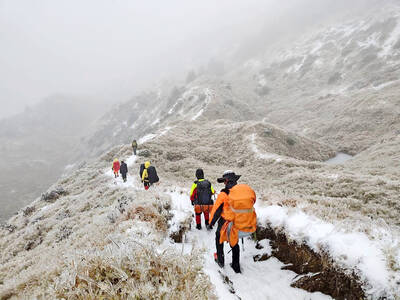EVA Airways, one of the leading international carriers in Taiwan, yesterday said that it was investigating reports that a cabin crew manager had ignored the condition of a sick flight attendant, who died on Saturday.
The airline made the statement in response to a post circulating on social media that said that the flight attendant on an outbound flight was feeling sick and notified the cabin crew manager.
Although the flight attendant grew increasingly ill on the return flight, the manager did not contact Medlink — a system that connects the aircraft to doctors on the ground for treatment advice during medical emergencies — and instead insisted that she continue working, the post said.

Photo: Tsai Yung-jung, Taipei Times
When the plane landed, the manager ignored the flight attendant’s requests to use a wheelchair and call an ambulance, it said, adding that the flight attendant was eventually taken to the hospital, where she later died.
“This was not some regrettable coincidence, but the result of systemic and long-term indifference to crew members’ health,” said the post, which was written anonymously by a person who identified themselves as a fellow flight attendant.
In a joint statement yesterday, the Taoyuan Flight Attendants Union and EVA Airways’ corporate union said that the incident had occurred on a flight from Milan to Taipei late last month.
The unions said they hoped the tragedy would make the airline more responsive to the needs of its cabin crew, who are often afraid to take sick or personal leave, because it could affect their performance review and annual bonus.
The unions are also looking into whether the cabin crew manager’s behavior constituted workplace bullying, and encouraged EVA Airways to do the same, the statement said.
The airline confirmed that it had been in contact with the flight attendant’s family during her hospitalization, and had learned of her “tragic death” on Saturday.
The company said they offered their deepest condolences and would continue to provide support to the flight attendant’s family, adding that they were investigating the incident.
Meanwhile, the Taoyuan City Office of Labor Inspection yesterday said that it had dispatched officials to EVA Airways to begin its own investigation into the incident.

Trips for more than 100,000 international and domestic air travelers could be disrupted as China launches a military exercise around Taiwan today, Taiwan’s Civil Aviation Administration (CAA) said yesterday. The exercise could affect nearly 900 flights scheduled to enter the Taipei Flight Information Region (FIR) during the exercise window, it added. A notice issued by the Chinese Civil Aviation Administration showed there would be seven temporary zones around the Taiwan Strait which would be used for live-fire exercises, lasting from 8am to 6pm today. All aircraft are prohibited from entering during exercise, it says. Taipei FIR has 14 international air routes and

The Ministry of National Defense (MND) today released images of the military tracking China’s People's Liberation Army (PLA) movements during the latest round of Chinese drills around Taiwan. The PLA began "Justice Mission 2025" drills today, carrying out live-fire drills, simulated strikes on land and maritime targets, and exercises to blockade the nation's main ports. The exercises are to continue tomorrow, with the PLA announcing sea and air space restrictions for five zones around Taiwan for 10 hours starting from 8:30am. The ministry today released images showing a Chinese J-16 fighter jet tracked by a F-16V Block 20 jet and the

Snow fell on Yushan (Jade Mountain, 玉山) yesterday morning as a continental cold air mass sent temperatures below freezing on Taiwan’s tallest peak, the Central Weather Administration (CWA) said. Snowflakes were seen on Yushan’s north peak from 6:28am to 6:38am, but they did not fully cover the ground and no accumulation was recorded, the CWA said. As of 7:42am, the lowest temperature recorded across Taiwan was minus-5.5°C at Yushan’s Fengkou observatory and minus-4.7°C at the Yushan observatory, CWA data showed. On Hehuanshan (合歡山) in Nantou County, a low of 1.3°C was recorded at 6:39pm, when ice pellets fell at Songsyue Lodge (松雪樓), a

NO SHAME IN RETREAT: Hikers should consider turning back if the weather turns bad or if they do not have sufficient equipment, the Taroko park headquarters said Two people died of hypothermia over the weekend while hiking on Hsuehshan (雪山), prompting park authorities to remind hikers to bring proper equipment and consider their physical condition before setting out in the cold weather. Temperatures dropped over the weekend, bringing snow to high altitudes in Shei-pa National Park. One hiker, surnamed Lin (林), who on Friday was traveling with a group of six along the Hsuehshan west ridge trail, lost consciousness due to hypothermia and died, the Shei-pa National Park Headquarters said. On Saturday, another hiker, surnamed Tien (田), in a group of five on the southeast of the west